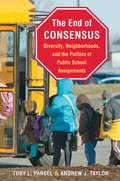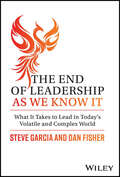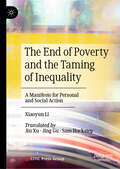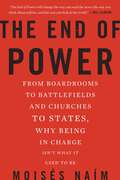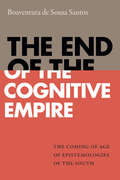- Table View
- List View
The End of Burnout: Why Work Drains Us and How to Build Better Lives
by Jonathan MalesicGoing beyond the how and why of burnout, a former tenured professor combines academic methods and first-person experience to propose new ways for resisting our cultural obsession with work and transforming our vision of human flourishing. Burnout has become our go-to term for talking about the pressure and dissatisfaction we experience at work. But because we don’t really understand what burnout means, the discourse does little to help workers who are suffering from exhaustion and despair. Jonathan Malesic was one of those workers, and to escape he quit his job as a tenured professor. In The End of Burnout, he dives into the history and psychology of burnout, traces the origin of the high ideals we bring to our dismal jobs, and profiles the individuals and communities who are already resisting our cultural commitment to constant work. In The End of Burnout, Malesic traces his own history as someone who burned out of a tenured job to frame this rigorous investigation of how and why so many of us feel worn out, alienated, and useless in our work. Through research on the science, culture, and philosophy of burnout, Malesic explores the gap between our vocation and our jobs, and between the ideals we have for work and the reality of what we have to do. He eschews the usual prevailing wisdom in confronting burnout ("Learn to say no!" "Practice mindfulness!") to examine how our jobs have been constructed as a symbol of our value and our total identity. Beyond looking at what drives burnout—unfairness, a lack of autonomy, a breakdown of community, mismatches of values—this book spotlights groups that are addressing these failures of ethics. We can look to communities of monks, employees of a Dallas nonprofit, intense hobbyists, and artists with disabilities to see the possibilities for resisting a "total work" environment and the paths to recognizing the dignity of workers and nonworkers alike. In this critical yet deeply humane book, Malesic offers the vocabulary we need to recognize burnout, overcome burnout culture, and find moral significance in our lives beyond work.
The End of Competitive Advantage
by Rita Gunther Mcgrath Alex GourlayAre you at risk of being trapped in an uncompetitive business?Chances are the strategies that worked well for you even a few years ago no longer deliver the results you need. Dramatic changes in business have unearthed a major gap between traditional approaches to strategy and the way the real world works now.In short, strategy is stuck. Most leaders are using frameworks that were designed for a different era of business and based on a single dominant idea-that the purpose of strategy is to achieve a sustainable competitive advantage. Once the premise on which all strategies were built, this idea is increasingly irrelevant.Now, Columbia Business School professor and globally recognized strategy expert Rita Gunther McGrath argues that it's time to go beyond the very concept of sustainable competitive advantage. Instead, organizations need to forge a new path to winning: capturing opportunities fast, exploiting them decisively, and moving on even before they are exhausted. She shows how to do this with a new set of practices based on the notion of transient competitive advantage.This book serves as a new playbook for strategy, one based on updated assumptions about how the world works, and shows how some of the world's most successful companies use this method to compete and win today.Filled with compelling examples from "growth outlier" firms such as Fujifilm, Cognizant Technology Solutions, Infosys, Yahoo! Japan, and Atmos Energy, The End of Competitive Advantage is your guide to renewed success and profitable growth in an economy increasingly defined by transient advantage.
The End of Consensus
by Andrew J. Taylor Toby L. ParcelOne of the nation's fastest growing metropolitan areas, Wake County, North Carolina, added more than a quarter million new residents during the first decade of this century, an increase of almost 45 percent. At the same time, partisanship increasingly dominated local politics, including school board races. Against this backdrop, Toby Parcel and Andrew Taylor consider the ways diversity and neighborhood schools have influenced school assignment policies in Wake County, particularly during 2000-2012, when these policies became controversial locally and a topic of national attention. The End of Consensus explores the extraordinary transformation of Wake County during this period, revealing inextricable links between population growth, political ideology, and controversial K-12 education policies.Drawing on media coverage, in-depth interviews with community leaders, and responses from focus groups, Parcel and Taylor's innovative work combines insights from these sources with findings from a survey of 1,700 county residents. Using a broad range of materials and methods, the authors have produced the definitive story of politics and change in public school assignments in Wake County while demonstrating the importance of these dynamics to cities across the country.
The End of Country
by Seamus McgrawThe End of Country is the compelling story about the epic battle for control of one of the richest natural gas deposits the world has ever known: the Marcellus Shale, worth more than one trillion dollars. In a remote northeastern corner of Pennsylvania, an intense conflict begins, pitting the forces of corporate America against a community of stoic, low-income homesteaders, determined to acquire their fair share of the windfall--but not at the cost of their values or their way of life. Though the natural gas is extracted through a controversial process known as hydrofracking, many couldn't resist the offer to lease their land in exchange for the promise of untold riches.For years, this part of the world was invisible to all but the farmers, urban transplants, and small landholders who called it home. But journalist Seamus McGraw, a native of the region whose own mother was one of the first to receive a leasing offer, opens a window on a stiff-necked group of Pennsylvanians as they try, with little guidance or protection from the state or anyone else, to balance the promise and the peril of this discovery. Along the way, McGraw introduces us to a host of colorful characters, from a gas company land agent with a Green Beret to a wizened quarryman with an old coonhound, a .22 rifle, and an unerring sense of right and wrong who leads a personal crusade to police the gas company's operations.The cutthroat dash by petrodollar billionaires to secure drilling leases will make some poor residents rich, and put the entire community at risk of having its land tainted by toxic chemicals and its water supply contaminated by gas. Above all, it will test the character of everyone in the community as they fight against "the end of country."Rich with a sense of place and populated by unforgettable personalities, The End of Country is a tale of greed, hubris, and envy, but also of hope and family--and the land that binds them all together.From the Hardcover edition. of greed, hubris, and envy, but also of hope and family--and the land that binds them all together.From the Hardcover edition.
The End of Equality
by Carlo BordoniThe economic crisis has brought social differences to the fore, reinventing the old question of inequality as democracy’s missed opportunity. Many have attempted to find a rational explanation of the problem, tracing it back to poor economic policy and reckless liberalisation of finance, or the crisis of banks and governments, as well as the collapse of family relationships. At the same time, globalisation has reduced the differences between some nations, bringing emerging countries to the level of the more advanced, but has dangerously increased internal inequalities. In this book, the author examines the question of inequality and the social problems it is creating in societies across the world, arguing that with the crisis of modernity, the ideal of equality appears to be over. As more and more of the world’s resources are concentrated in ever fewer hands, the promise of mass society as a means to grant equality and cancel the differences of classes appears to be giving way to a rising individualism. This book asks whether the apparent end of mass society will coincide with the end of equality and a re-evaluation of the worth of the individual. Are we heading towards a liquid world in which being equal is now considered less a virtue than a weakness?
The End of Forgetting: Growing Up with Social Media
by Kate EichhornThanks to Facebook and Instagram, our younger selves have been captured and preserved online. But what happens, Kate Eichhorn asks, when we can’t leave our most embarrassing moments behind? Rather than a childhood cut short by a loss of innocence, the real crisis of the digital age may be the specter of a childhood that can never be forgotten.
The End of Ideology: On the Exhaustion of Political Ideas in the Fifties
by Daniel BellThese essay, in the main, deal with the social changes in the America of the fifties. It was a decade marked by extraordinary changes in the class structure, particularly in the growth of the white-collar class and the spread of suburbia; by the "forced" expansion of the economy, which belied earlier predictions of stagnation; by the creation of a permanent military establishment and a bedrock defense economy; and by the heightening tensions of the Cold War. In consequence, we have had the problem, abroad, of defining ourselves to Indians, Africans, Arabs, et al., and, at home, a preoccupation with "self" and "status" that has brought to the fore not only psychoanalysis but the mirror of popular sociology. The "restless vanity" of which de Tocqueville spoke, which made the American, in his intercourse with strangers, "impatient of the slightest censure and insatiable of praise," has been replaced by an anxious inferiority, fearful of censure and desperately eager to please.
The End of Ignorance: Multiplying Our Human Potential
by John MightonA revolutionary call for a new understanding of how people learn. The End of Ignorance conceives of a world in which no child is left behind -- a world based on the assumption that each child has the potential to be successful in every subject. John Mighton argues that by recognizing the barriers that we have experienced in our own educational development, by identifying the moment that we became disenchanted with a certain subject and forever closed ourselves off to it, we will be able to eliminate these same barriers from standing in the way of our children. A passionate examination of our present education system, The End of Ignorance shows how we all can work together to reinvent the way that we are taught.John Mighton, the author of The Myth of Ability, is the founder of JUMP Math, a system of learning based on the fostering of emergent intelligence. The program has proved so successful an entire class of Grade 3 students, including so-called slow learners, scored over 90% on a Grade 6 math test. A group of British children who had effectively been written off as too unruly responded so enthusiastically and had such impressive results using the JUMP method that the school board has adopted the program. Inspired by the work he has done with thousands of students, Mighton shows us why we must not underestimate how much ground can be covered one small step at a time, and challenges us to re-examine the assumptions underlying current educational theory. He pays attention to how kids pay attention, chronicles what captures their imaginations, and explains why their sense of self-confidence and ability to focus are as important to their academic success at school as the content of their lessons.
The End of Illusions: Politics, Economy, and Culture in Late Modernity
by Andreas ReckwitzWe live in a time of great uncertainty about the future. Those heady days of the late twentieth century, when the end of the Cold War seemed to be ushering in a new and more optimistic age, now seem like a distant memory. During the last couple of decades, we’ve been battered by one crisis after another and the idea that humanity is on a progressive path to a better future seems like an illusion. It is only now that we can see clearly the real scope and structure of the profound shifts that Western societies have undergone over the last 30 years. Classical industrial society has been transformed into a late-modern society that is molded by polarization and paradoxes. The pervasive singularization of the social, the orientation toward the unique and exceptional, generates systematic asymmetries and disparities, and hence progress and unease go hand in hand. Reckwitz examines this dual structure of singularization and polarization as it plays itself out in the different sectors of our societies and, in so doing, he outlines the central structural features of the present: the new class society, the characteristics of a postindustrial economy, the conflict about culture and identity, the exhaustion of the self resulting from the imperative to seek authentic fulfillment, and the political crisis of liberalism. Building on his path-breaking work The Society of Singularities, this new book will be of great interest to students and scholars in sociology, politics, and the social sciences generally, and to anyone concerned with the great social and political issues of our time.
The End of Intelligence: Espionage and State Power in the Information Age
by David TuckerUsing espionage as a test case, The End of Intelligence criticizes claims that the recent information revolution has weakened the state, revolutionized warfare, and changed the balance of power between states and non-state actors—and it assesses the potential for realizing any hopes we might have for reforming intelligence and espionage. Examining espionage, counterintelligence, and covert action, the book argues that, contrary to prevailing views, the information revolution is increasing the power of states relative to non-state actors and threatening privacy more than secrecy. Arguing that intelligence organizations may be taken as the paradigmatic organizations of the information age, author David Tucker shows the limits of information gathering and analysis even in these organizations, where failures at self-knowledge point to broader limits on human knowledge—even in our supposed age of transparency. He argues that, in this complex context, both intuitive judgment and morality remain as important as ever and undervalued by those arguing for the transformative effects of information. This book will challenge what we think we know about the power of information and the state, and about the likely twenty-first century fate of secrecy and privacy.
The End of International Adoption?: An Unraveling Reproductive Market and the Politics of Healthy Babies (Families in Focus)
by Estye FentonSince 2004, the number of international adoptions in the United States has declined by more than seventy percent. In The End of International Adoption? Estye Fenton studies parents in the United States who adopted internationally in the past decade during this shift. She investigates the experiences of a cohort of adoptive mothers who were forced to negotiate their desire to be parents in the context of a growing societal awareness of international adoption as a flawed reproductive marketplace. Many parents, activists, and scholars have questioned whether the inequality inherent in international adoption renders the entire system suspect. In the face of such concerns, international adoption has not only become more difficult, but also more politically and ethically fraught. The mothers interviewed for this book found themselves navigating contemporary American family life in an unexpected way, caught between the double-bind of work-family life and a new paradigm of thinking about the method—international adoption—that they used to create those families.
The End of Leadership as We Know It: What It Takes to Lead in Today's Volatile and Complex World
by Steve Garcia Dan FisherMaximize your leadership impact with the latest insights and research from the field of adaptive leadership In The End of Leadership as We Know It, a team of veteran executive and leadership strategists delivers an expert analysis of the ten most common errors leaders make when attempting to address disruption and concrete strategies for avoiding them. In the book, you’ll find ways to apply the latest research in adaptive leadership and complexity to your own leadership style and achieve the impact you seek to have on your business, your followers, and yourself. The authors explain how to rethink the essence of leadership during times of flux and show you how to deal with unpredictable situations. You’ll also find: Ways to identify the devastating blind spots caused by current approaches to leadership Strategies for unleashing the creativity and potential of employees, rather than controlling them Tough-love feedback for contemporary leaders doing their best to deliver results in an increasingly uncertain and volatile business environmentFull of creativity and inspirational energy, The End of Leadership as We Know It will benefit managers, executives, board members, business students and other current and aspiring business leaders.
The End of Love: A Sociology of Negative Relations
by Eva IllouzWestern culture has endlessly represented the ways in which love miraculously erupts in people’s lives, the mythical moment in which one knows someone is destined for us, the feverish waiting for a phone call or an email, the thrill that runs down our spine at the mere thought of him or her. Yet, a culture that has so much to say about love is virtually silent on the no less mysterious moments when we avoid falling in love, where we fall out of love, when the one who kept us awake at night now leaves us indifferent, or when we hurry away from those who excited us a few months or even a few hours before. In The End of Love, Eva Illouz documents the multifarious ways in which relationships end. She argues that if modern love was once marked by the freedom to enter sexual and emotional bonds according to one’s will and choice, contemporary love has now become characterized by practices of non-choice, the freedom to withdraw from relationships. Illouz dubs this process by which relationships fade, evaporate, dissolve, and break down “unloving.” While sociology has classically focused on the formation of social bonds, The End of Love makes a powerful case for studying why and how social bonds collapse and dissolve. Particularly striking is the role that capitalism plays in practices of non-choice and “unloving.” The unmaking of social bonds, she argues, is connected to contemporary capitalism which is characterized by practices of non-commitment and non-choice, practices that enable the quick withdrawal from a transaction and the quick realignment of prices and the breaking of loyalties. Unloving and non-choice have in turn a profound impact on society and economics as they explain why people may be having fewer children, increasingly living alone, and having less sex. The End of Love presents a profound and original analysis of the effects of capitalism and consumer culture on personal relationships and of what the dissolution of personal relationships means for capitalism.
The End of Nomadism?: Society, State, and the Environment in Inner Asia
by Caroline Humphrey David Andrews SneathThose who herd in the vast grassland region of Inner Asia face a precarious situation as they struggle to respond to the momentous political and economic changes of recent years. In The End of Nomadism? Caroline Humphrey and David Sneath confront the romantic, ahistorical myth of the wandering nomad by revealing the complex lives and the significant impact on Asian culture of these modern "mobile pastoralists." In their examination of the present and future of pastoralism, the authors recount the extensive and quite sudden social, political, environmental, and economic changes of recent years that have forced these peoples to respond and evolve in order to maintain their centuries-old way of life. Using extensive and detailed case studies comparing pastoralism in Siberian Russia, Mongolia, and Northwest China, Humphrey and Sneath explore the different paths taken by nomads in these countries in reaction to a changing world. In examining how each culture is facing not only different prospects for sustainability but also different environmental problems, the authors come to the surprising conclusion that mobility can, in fact, be compatible with a modern and urbanized world. While placing emphasis on the social and cultural traditions of Inner Asia and their fate in the post-Socialist economies of the present, The End of Nomadism? investigates the changing nature of pastoralism by focusing on key areas under environmental threat and relating the ongoing problems to distinctive socioeconomic policies and practices in Russia and China. It also provides lively contemporary commentary on current economic dilemmas by revealing in telling detail, for instance, the struggle of one extended family to make a living. This book will interest Central Asian, Russian, and Chinese specialists, as well as those studying the environment, anthropology, sociology, peasant studies, and ecology.
The End of Poverty and the Taming of Inequality: A Manifesto for Personal and Social Action
by Xiaoyun LiIn this book, Li Xiaoyun tries to address these questions that attract public attention in today’s China. Drawing on classic and cutting-edge poverty research from political economy, economics and social psychology, Li elaborates on the political and social meanings of China’s recent war on extreme poverty and the institutional set-ups that helped the country successfully escape the poverty trap. Adopting a quasi auto-ethnography of his poverty experiment in a poor ethnic village in China, Li presents an excruciating adventure of how the country and its people fought against poverty from a bottom-up perspective which brings this book alive. A collection of essays and opinion pieces, this book is an “espresso” of Li’s insights and inquiries on China’s chronical and transitional poverty which may interest not only a small circle of poverty researchers, policy-makers, practitioners, but also a wider spectrum of readers who want to understand a real China in development.
The End of Power: From Boardrooms to Battlefields and Churches to States, Why Being In Charge Isn't What It Used to Be
by Moisés NaímPower is shiftingOCofrom large, stable armies to loose bands of insurgents, from corporate leviathans to nimble start-ups, and from presidential palaces to public squares. But power is also changing, becoming harder to use and easier to lose. As a result, argues award-winning columnist and former "Foreign Policy" editor Mois(r)s Na m, all leaders have less power than their predecessors, and the potential for upheaval is unprecedented. In "The End of Power," Na m illuminates the struggle between once-dominant megaplayers and the new micropowers challenging them in every field of human endeavor. The antiestablishment drive of micropowers can topple tyrants, dislodge monopolies, and open remarkable new opportunities, but it can also lead to chaos and paralysis. Drawing on provocative, original research and a lifetime of experience in global affairs, Na m explains how the end of power is reconfiguring our world. "
The End of Rationality and Selfishness: A Story on the Asymmetry, Uncertainty and the Evolution of Cooperation
by Rui-Wu WangThis book reviews the antinomy of rationality and selfishness raised from egoism, though rationality and selfishness are understood as basic evolutionary dynamics of humans and other organisms in both classical economics and evolutionary biology. Based on the research and a comparison with human’s social cooperative behavior, the author presents his belief that the social cooperative system, in its essence, cooperation and conflict are of uncertain stochasticity resulting from their intrinsic asymmetric interaction between cooperative partners. The book then discusses limitations of Newton’s methodology of monism in both biology and social science. The understanding of the asymmetric and uncertain characteristics found in cooperation system needs perspective of quantum physics of pluralism. At the end of the book, the author undertakes a review of consistency of Newtonian and monism philosophy and the links between quantum physics and pluralism philosophy.
The End of the Cognitive Empire: The Coming of Age of Epistemologies of the South
by Boaventura De SantosIn The End of the Cognitive Empire Boaventura de Sousa Santos further develops his concept of the "epistemologies of the South," in which he outlines a theoretical, methodological, and pedagogical framework for challenging the dominance of Eurocentric thought. As a collection of knowledges born of and anchored in the experiences of marginalized peoples who actively resist capitalism, colonialism, and patriarchy, epistemologies of the South represent those forms of knowledge that are generally discredited, erased, and ignored by dominant cultures of the global North. Noting the declining efficacy of established social and political solutions to combat inequality and discrimination, Santos suggests that global justice can only come about through an epistemological shift that guarantees cognitive justice. Such a shift would create new, alternative strategies for political mobilization and activism and give oppressed social groups the means through which to represent the world as their own and in their own terms.
The End of the Job Description: Shifting From a Job-Focus To a Performance-Focus
by Tim Baker'That's not my job.' If you don't want your employees to say that, why do you start your relationship by giving them a narrow task and competency focused description of their job? We need people to fulfil many different roles at work yes the need to do their job, but they also need to contribute positive energy, collaborate, and take personal reasonability for innovation and personal development. How do they fit into a traditional job description? It is futile persevering with the job description borne out of the scientific management movement one hundred years ago. The world of work is vastly different to the assembly lines of the Ford Motor Company of the early twentieth-century. Building on the phenomenal success of The End of the Performance Review, Baker examines four essential 'Non-Job' roles that all employees must fulfil and shows how to create meaningful role descriptions that can help you recruit better people and enable them to deliver better results.
The End of the Line: The Last Ten Years at Swindon Works
by Ron BatemanIn 1977, the iconic Swindon Works was building locomotives. By 1986, it was shut down. In The End of the Line, Ron Bateman recounts the fight to save Swindon Works, its 3,500 jobs and the livelihood of the entire community it represented. Initially joining through the Works Training School in 1977, Ron witnessed this tragic struggle and the crushing blow dealt to the industry that had defined Swindon for generations. Combining personal recollections with information and interviews from many other insiders and railmen, this book provides the only comprehensive chronicle on the final decade of 147 years of railway engineering and a fateful milestone in the history of Swindon.
The End of the Modernist Era in Arts and Academia (Classical and Contemporary Social Theory)
by Bruce FlemingThis book identifies the—now moribund—Modernist spirit of the twentieth century, with its "make it new" attitude in the arts, and its tendency towards abstraction and the scientific process, as the impetus behind the academic structures of universities and museums, together with the development of discrete scholarly disciplines such as literary theory, sociology, and art history based on quasi-scientific principles. Arguing that the Modernist project is approaching exhaustion and that the insights that it has left to yield are approaching triviality, it explores the Modernist links between the arts and academic pursuits of the West—and their relationship with street protests—in the long twentieth century, considering what might follow this Modernist era. An examination of the broad cultural and intellectual—and now political—trends of our age, and their decline, The End of the Modernist Era in Arts and Academia will appeal to scholars and students of social theory, philosophy, literary studies, and cultural studies.
The End of the Novel of Love
by Vivian GornickA finalist for the National Book Critics Circle Award for Criticism that explores the meaning of love and marriage as literary themes in the twentieth century.In The End of the Novel of Love, an acclaimed and provocative collection of criticism, Gornick applies the same intelligence, honesty, and insight that define her memoirs to an analysis of love and marriage as literary themes in the twentieth century. She examines the work and lives of several authors she admires—including Grace Paley, Willa Cather, Jean Rhys, George Meredith, Jane Smiley, Richard Ford, and Andre Dubus—to ultimately posit that love, sexual fulfillment, and marriage are now exhausted as the metaphorical expressions of success and happiness.Spanning the depths of common experience and the expanse of twentieth century literature, Gornick crafts an argument that is as defined by discourse as it is by the power of her language, which is gracefully poised between objective knowledge and subjective experience. In these eleven essays, she comes to see that, for most writers, like most readers, it is the drama of our angry and frightened selves in the presence of love that is our modern preoccupation. The End of the Novel of Love is a strikingly original and thought-provoking collection from a canonical critic.“Reading her essays, one is reassured that the conversation between life and literature is mutually sustaining as well as mutually corrective.” —The New York Times Book Review“Small in bulk but large in implication. The book is a pleasure and a stimulus: persuasive, finely wrought, quivering with intelligence.” —George Scialabba, Boston Review“An exceptionally well-written, original, and thought-provoking set of essays.” —Kirkus Reviews
The End of the Obesity Epidemic
by Michael GardDespite apocalyptic predictions from a vocal alliance of health professionals, politicians and social commentators that rising obesity levels would lead to a global health crisis, the crisis has not materialised. In this provocative follow up to his classic work of obesity scepticism, The Obesity Epidemic, Michael Gard argues that we have entered into a new, and perhaps terminal, phase of the obesity debate. Evidence suggests that obesity rates are levelling off in Western societies, life expectancies continue to rise in line with rising obesity rates, and across the world policy-makers have remained largely indifferent and inactive in the face of this apparently deadly threat to our health and well-being. Dissecting and dismissing much of the over-blown rhetoric and ideological bias found on both sides of the obesity debate, Gard demonstrates that the science of obesity remains radically uncertain and that it is impossible to establish an objective ‘truth’ on which to base policy. His powerful and inescapable conclusion is that we should now mark the end of the obesity epidemic. Offering a road map through the maze of claims and counter-claims, while still holding to a sceptical standpoint, this book provides an unparalleled anatomy of obesity as a scientific, political and cultural issue. It is essential reading for anybody with an interest in the science or sociology of health and lifestyle.
The End of the Suburbs: Where the American Dream Is Moving
by Leigh Gallagher"The government in the past created one American Dream at the expense of almost all others: the dream of a house, a lawn, a picket fence, two children, and a car. But there is no single American Dream anymore. ” For nearly 70 years, the suburbs were as American as apple pie. As the middle class ballooned and single-family homes and cars became more affordable, we flocked to pre-fabricated communities in the suburbs, a place where open air and solitude offered a retreat from our dense, polluted cities. Before long, success became synonymous with a private home in a bedroom community complete with a yard, a two-car garage and a commute to the office, and subdivisions quickly blanketed our landscape. But in recent years things have started to change. An epic housing crisis revealed existing problems with this unique pattern of development, while the steady pull of long-simmering economic, societal and demographic forces has culminated in a Perfect Storm that has led to a profound shift in the way we desire to live. In The End of the Suburbs journalist Leigh Gallagher traces the rise and fall of American suburbia from the stately railroad suburbs that sprung up outside American cities in the 19th and early 20th centuries to current-day sprawling exurbs where residents spend as much as four hours each day commuting. Along the way she shows why suburbia was unsustainable from the start and explores the hundreds of new, alternative communities that are springing up around the country and promise to reshape our way of life for the better. Not all suburbs are going to vanish, of course, but Gallagher’s research and reporting show the trends are undeniable. Consider some of the forces at work: The nuclear family is no more: Our marriage and birth rates are steadily declining, while the single-person households are on the rise. Thus, the good schools and family-friendly lifestyle the suburbs promised are increasingly unnecessary. We want out of our cars: As the price of oil continues to rise, the hours long commutes forced on us by sprawl have become unaffordable for many. Meanwhile, today’s younger generation has expressed a perplexing indifference toward cars and driving. Both shifts have fueled demand for denser, pedestrian-friendly communities. Cities are booming. Once abandoned by the wealthy, cities are experiencing a renaissance, especially among younger generations and families with young children. At the same time, suburbs across the country have had to confront never-before-seen rates of poverty and crime. Blending powerful data with vivid on the ground reporting, Gallagher introduces us to a fascinating cast of characters, including the charismatic leader of the anti-sprawl movement; a mild-mannered Minnesotan who quit his job to convince the world that the suburbs are a financial Ponzi scheme; and the disaffected residents of suburbia, like the teacher whose punishing commute entailed leaving home at 4 a. m. and sleeping under her desk in her classroom. Along the way, she explains why understanding the shifts taking place is imperative to any discussion about the future of our housing landscape and of our society itself-and why that future will bring us stronger, healthier, happier and more diverse communities for everyone. .
The End of the Welfare State?: Responses to State Retrenchment (Studies in European Sociology #Vol. 3)
by Stefan Svallfors Peter Taylor-GoobyThroughout the world, politicians from all the main parties are cutting back on state welfare provision, encouraging people to use the private sector instead and developing increasingly stringent techniques for the surveillance of the poor. Almost all experts agree that we are likely to see further constraints on state welfare in the 21st Century. Gathering together the findings from up-to-date attitude surveys in Europe East and West, the US and Australasia, this revealing book shows that, contrary to the claims of many experts and policy-makers, the welfare state is still highly popular with the citizens of most countries. This evidence will add to controversy in an area of fundamental importance to public policy and to current social science debate.


